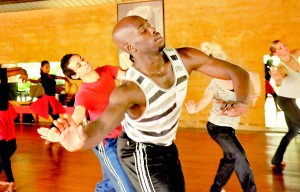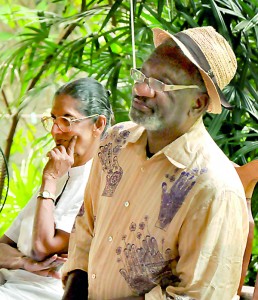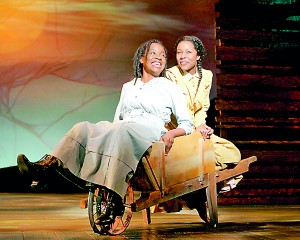Making a bold statement
View(s):“What is your dream?” Startled and amused, Donald Byrd looked at the little Bangladeshi boy, an answer already on the tip of his tongue. Now in his sixties, the artistic director of The Spectrum Dance Theatre had already led his own company for more than 20

Moving to a different beat: Spectrum Theatre dancers at the Chitrasena Kalayatanaya last week. Pix by Mangala Weerasekera
years, establishing himself in the process among the ranks of America’s most inventive and intelligent choreographers. His bold, confrontational work spanning over 80 pieces had taken on subjects like gender based violence, the war in Iraq, the holocaust and the suicide of Kurt Cobain. Then he was discovered by Broadway when he was nominated for a Tony for ‘The Colour Purple’ (he recently wrapped up a controversial revival of ‘Oklahoma.’) What was left to achieve?
“At first I thought I’m living it, but then I realised that my dream is to really contribute to the world through my art, to be a transformative agent in the world,” says Donald. It’s an ambition that while discovered early in his life has never dimmed. “What I say to myself, what I say to my dancers, is I have to do something that will get me out of bed in the morning. I don’t think I will ever retire. You know the expression ‘carry me out with my boots on?’ I’ll probably drop dead doing what I do. I really love it and for me making dances is a way to understand the world. That is my way of processing what I see and coming to a better understanding. It’s a spiritual process.”
Dance saved Donald, though it wasn’t quite his first choice, neither was music though he remains an accomplished flautist. When Donald enrolled in Yale, able to afford it only because of a scholarship, he wanted to become an actor. It was while at Yale that Donald

Food for thought: Vajira and Donald watch their performers
first experienced racism – a chair thrown at him from a passing car, a racial epithet hurled after as explanation. Born and raised in the south, Donald knew how to navigate institutionalised racism, but this felt different. A mounting discomfort would have Donald abandoning the course at Yale to switch to Tufts University in Boston. As he began to get more serious about dance he moved to New York and a loft on the edge of Chinatown which he shared with three other dancers.
Blogging about the experience, Donald wrote: ‘I was now obsessively consumed by dancing and completely immersed in the world of the New York dance scene. Dance was everything to me and nothing else existed.’ At one point, unable to find a job, he became effectively homeless, couch surfing or sleeping on park benches. “What that was for me was that it really taught me how dedicated I was to dancing,” he says now. “I was willing to do whatever it took to be a dancer.”
After a taste of success, that included working with Twyla Tharp, a giant in modern dance, and choreographing for the Alvin Ailey American Dance Theatre (whose ‘Revelations’ was one of his earliest inspirations) and his own ascendency as an independent choreographer of note, Donald began to struggle with an addiction to drugs and alcohol. He only checked himself into rehab in 1985 when it became clear that the quality of his work had suffered tremendously. Today he doesn’t smoke or drink, and says that “part of the process of recovery was recognising that there is something that you have no power over.” The discipline dance had taught him and his desire to get back to work pulled him through that very difficult period. “There’s nothing in my life that takes me away from reality now,” he says.
And for Donald, reality is that dance is a potent, powerful tool he can use to grapple with the issues that most concern him. As an African-America he has said that his work is based on the concerns of his community and that he sees himself as black first and a choreographer second. “The blackness, the Afro-Americanness, came first. And I don’t think that minimises what I do. In fact it gives a point of reference to what it is,” he said in an interview. It’s his willingness to engage with overt racism that had him staging

Phenomenal experience: Choreographing The Colour Purple on Broadway
controversial performances like The Minstrel Show in the early 90s.“First of all you just have to acknowledge the history of racism in American culture before you can get past it,” he says.
With a penchant for never playing it safe, Donald always assumed he would be a poor fit for Broadway but he remained curious. When an opportunity to choreograph the musical based on Alice Walker’s extraordinary novel came along, he took it. “The Colour Purple was the perfect for me because of the subject matter and its seriousness and ultimately, the joy in it.” The story of Nettie and Celie, the two black sisters from rural Georgia ran on Broadway from 2005 – 2008 and was nominated for 11 Tony awards (Oprah Winfrey who starred in the musical was also one of the producers on the show.)
“It was an amazing, phenomenal experience,” says Donald. “In many ways it changed my life.” Donald found that his work on the musical widened his exposure, winning him access to the world of commercial theatre. Last year he returned to Broadway to choreograph a revival of ‘Oklahoma’ and was a key part of the decision to abandon the model of an all-white cast and its black villain for a cast where the hero Jud was an African-American instead. The move reinvented an old classic and brought new audiences by the droves into the theatre.
In Sri Lanka at the behest of the American Centre in Colombo, Donald and his performers not only performed and taught but found time to study under the tutelage of the Chitrasena Dance Company as well as dancers from other parts of the island. He says the experience has got his mind whirring away already on how what they’ve seen can be incorporated into future performances of The Spectrum Dance Theatre.
Dance for him remains a powerful, perhaps the most powerful, of the arts. “Sometimes movement gets past our defences and it would affect us in a deeper emotional way than reading something would or even watching a documentary, a play or a movie,” says Donald. “Sometimes the dances that I make can shake people up, that’s what they do for me. I’m just sharing what happened to me with other people.”

Follow @timesonlinelk



















